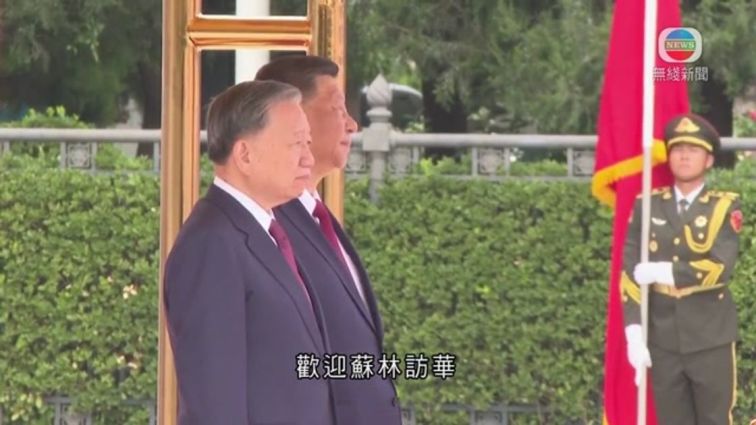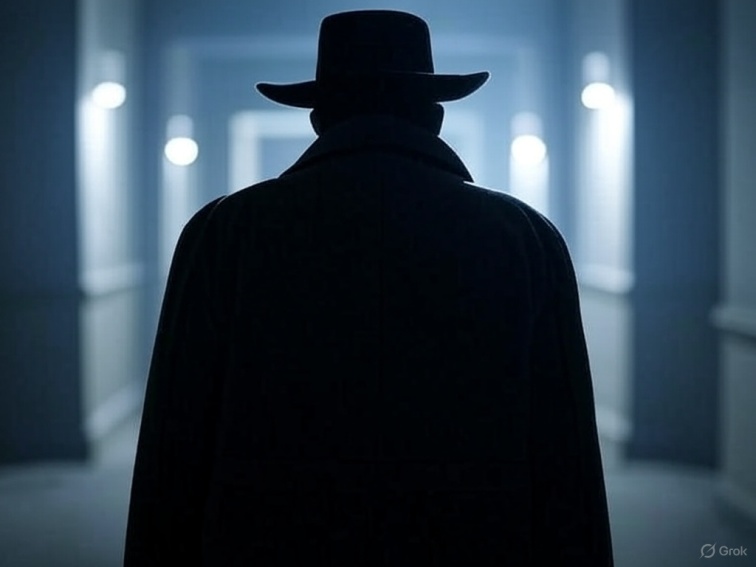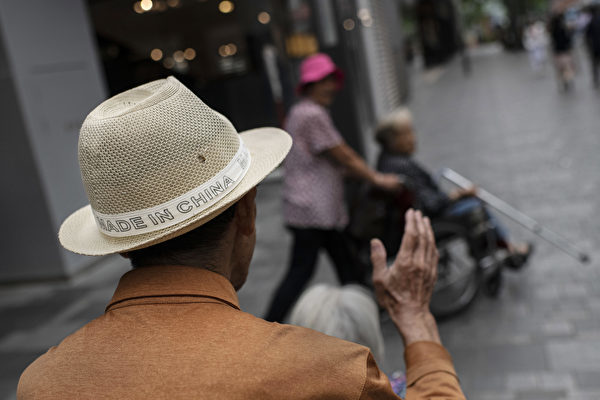File photo: On March 5, 2021, the day before the opening of China's National People's Congress (NPC), police patrol Tiananmen Square with dogs on a day of heavy air pollution in Beijing. (Photo by Kevin Frayer/Getty Images.)
[People News] On April 28, Catholic media outlet UCA News published an op-ed by French theologian Michel Chambon titled “China (the CCP) Slaps Pope Francis in His Coffin”. According to unofficial sources, the CCP demanded that the Vatican bar a Taiwanese delegation from attending the funeral. When the Vatican rejected this demand via diplomatic channels, the CCP responded by boycotting the event. Chambon warns that this move may influence the next papal election, making it harder for those who favour continuing Francis’ policy of constructive engagement with China to gain support.
According to Radio Free Asia, Chambon noted that Pope Francis repeatedly expressed love for the Chinese people and his desire to visit China. Over the past 12 years, he restarted China-Vatican dialogue and reached a controversial agreement with Beijing in 2018 on the appointment of bishops, despite heavy criticism. Yet on April 26, while leaders or high-level representatives from 160 countries attended the funeral, the CCP sent no delegation, not even one or two bishops from China.
Chambon wrote: “The CCP has betrayed a loyal friend and difficult partner. Going forward, it will be even harder to refute the argument that what the CCP truly seeks is not partners or friends, but vassals.”
He emphasised that this absence is not just about Taiwan. As the CCP positions itself as a rival to the U.S. and a defender of multilateralism, it is difficult to comprehend why it would snub one of the most compassionate multilateral voices—Pope Francis. “By slapping Pope Francis as he lies in his coffin, the CCP is essentially slapping the rest of the world.”
CCP's Absence Seen as an Insult to 1.4 Billion Catholics—and to Itself
Sung Kuo-cheng, a researcher at National Chengchi University’s Institute of International Relations, told Radio Free Asia on April 29 that as a devout Catholic, he finds the CCP’s absence, under the pretext of retaliating against Taiwan, utterly disgraceful. He called it a serious insult to 1.4 billion Catholics worldwide, and said the CCP has dishonoured Pope Francis, who maintained a friendly policy toward China for 12 years, only to be ignored in death.
Sung condemned the CCP’s diplomacy as “heartless and disloyal,” describing it as pure utilitarianism: treating allies as tools or bargaining chips to suppress Taiwan or gain unilateral dominance. By boycotting the Pope’s funeral, China has offended the global Catholic community and potentially altered Vatican policy on China and future papal attitudes. “A fool is incurable; a foolish party even more so,” he said. “This unwise act, done in the name of striking back at Taiwan, will have a price — and that price will come soon.”
Though Sung had previously criticised Francis’ pro-China policies, he said he privately prayed for the Pope at his study window after hearing the news of his death. Despite the challenges Francis posed to Catholic tradition, Sung emphasised that the Pope carried the sacred mission of spreading the Gospel to all, transcending politics and enemies. As a Latin American, Francis came from the tradition of Liberation Theology, focusing on faith’s role in uplifting the poor and promoting political freedom.
“The Dead Deserve Respect” — But the CCP Shows Cold Contempt
Sung harshly criticised the CCP’s actions: “Chinese tradition teaches us that ‘the dead deserve respect.’ Yet the CCP was cold and heartless toward the spiritual leader of 1.4 billion believers.” He accused the Communist Party not just of atheism, but of “blasphemy.” He urged the new Pope to recognise the true nature of the CCP and maintain diplomatic ties with Taiwan, which upholds Catholic values. “This base regime, which treats religion as a tool or toy, will only be despised by believers of all faiths. Catholics must take this event as a warning and be cautious toward regimes that persecute religion.”
Gongzi Shen, a U.S.-based current affairs commentator, also told Radio Free Asia that the CCP sees the Vatican solely as a political entity: if it obeys, it gets rewarded; if not, it gets punished. But from the Vatican’s perspective, the Pope’s funeral is a religious event, not a diplomatic one. Any country, especially one with diplomatic ties like Taiwan, should be able to send representatives. Instead, the CCP imposed political conditions on the Vatican, politicising what should have been a civil society event.
Shen noted that even after Pope Francis compromised with Beijing, it brought no religious freedom or improvement in human rights for believers in China. The CCP’s retaliation only proves the futility of appeasement.
In 2005, when Pope John Paul II died, then-President Chen Shui-bian of Taiwan was invited and seated in the front row. When Francis was installed as Pope, then-President Ma Ying-jeou and his wife attended the inauguration. This time, the Vatican declined to invite President Lai Ching-te, and Taiwan had to send former Vice President Chen Chien-jen and his wife instead. The highest-ranking current official was only a Deputy Foreign Minister, sparking concerns over a significant downgrade in Taiwan’s diplomatic stature.
Taiwan Already Stepped Back Three Levels, Vatican Gave China Ample Respect — But CCP Still Treated Pope's Funeral as a Diplomatic Tool
Gongzi Shen analysed: “The Chinese Communist Party (CCP) sees itself as having risen, able to rival the U.S. and influence other countries' decisions. It always pushes the limits — if you don’t agree, it feels disrespected. Even though Taiwan had already made significant concessions and the Vatican had given Beijing considerable face, the CCP still deemed it insufficient. For the Communist Party and Leninist authoritarian regimes, rituals like honouring the dead are secondary to securing status and power.”
Pastor Bob Fu, president of the U.S.-based NGO ChinaAid, told Radio Free Asia that it’s not surprising the CCP skipped the funeral. The Party’s entire approach to religion is about United Front work — its goal is to isolate Taiwan and control the Catholic Church in China. “To the CCP, the Vatican is not even a vassal, but a tool — something to use when needed, like signing secret agreements. If the Vatican helps Taiwan, the CCP retaliates. This time, the Vatican tried to appease and flatter China, but got nothing in return — just a slap in the face.”
Chang Meng-jen, head of the Italian Literature Department at Fu Jen Catholic University in Taiwan, who met Pope Francis in Rome late last year, also told Radio Free Asia that Beijing believed Francis had already made extensive concessions to China over the past six years. It was likely hoped his death would pressure the Vatican into excluding Taiwan’s president from the funeral. But the Holy See still valued its diplomatic ties with Taiwan.
Taiwan Scholar: Vatican Resisted Beijing Pressure Despite Not Inviting the President
Chang said: “The Holy See still regards the Republic of China (Taiwan) as a friend. It resisted CCP pressure and allowed Taiwan to send representatives, though at a relatively lower level, to also honor the Vatican's relationship with Beijing. Ultimately, China (the CCP) is the biggest loser. Pope Francis extended a huge olive branch during his papacy, but Beijing’s absence at his funeral will cast a shadow over its relationship with the next pope.”
China Refuses to Say Whether It Sent a Delegation
At the Chinese Foreign Ministry’s regular press briefing on April 28, Reuters asked whether China had sent any representatives to Pope Francis’ funeral on April 26. Spokesman Guo Jiakun avoided a direct answer, simply saying: “I have no information to provide. On the issue of China-Vatican relations, our position is consistent.”
In response to China's retaliatory absence after failing to pressure the Vatican to exclude Taiwan, Taiwan’s Foreign Ministry spokesman Jeff Liu (Hsiao Kuang-wei) told Radio Free Asia that the ministry continues to monitor China-Vatican interactions and acknowledges that the Vatican is engaged in dialogue with the CCP to improve conditions for Chinese Catholics. However, he noted that religious freedom and human rights violations in China continue to worsen, and called on the international community to condemn the CCP’s behaviour and press it to stop infringing on basic freedoms.
Liu emphasised that Taiwan and the Vatican have enjoyed 83 years of diplomatic relations and strong ties. President Lai appointed former Vice President Chen Chien-jen to represent Taiwan in expressing condolences and meeting with senior clergy and representatives from other nations. Taiwan, he said, will continue to deepen its relationship with the Vatican and promote universal religious freedom.
Will China’s Absence Affect the Next Pope’s China Policy?
Will China’s absence from Francis’ funeral affect future China-Vatican relations and the next pope’s stance? Gongzi Shen believes it won’t. He said the Vatican likely sees the CCP’s true nature, but there will always be pro-Beijing voices willing to be bought off. “It’ll be similar to Francis’ papacy — the Vatican will keep extending olive branches, only to be repeatedly slapped by the CCP, yet it’ll still keep trying.”
Gongzi added that even if formal diplomatic relations are established, the Vatican will find it impossible to practice Catholicism freely in China — friction is inevitable.
Pastor Fu echoed this view. He warned that if pro-CCP Cardinal Pietro Parolin is elected pope, he likely wouldn’t mind the current CCP boycott and would lean even further toward Beijing, having previously engaged in numerous dealings with the CCP.
Fu hopes the next pope will have the courage to uphold Catholic tradition and Biblical justice, standing up for persecuted believers in China, as well as victims of oppression in Hong Kong and Taiwan. “The Vatican must break its silence and choose to walk humbly with God, not with the devil.”
Chang Meng-jen noted that Francis' pro-China policy faced heavy backlash and that he had shielded his approach from internal criticism. If Parolin is elected — someone aligned with Francis’ China policy for two decades — he may lack Francis’ patience and tolerance. But if the Vatican no longer fears CCP pressure over Taiwan, its relations with Taipei could improve. The Vatican will also observe whether Beijing’s “Sinicisation of religion” policy offers any goodwill.











News magazine bootstrap themes!
I like this themes, fast loading and look profesional
Thank you Carlos!
You're welcome!
Please support me with give positive rating!
Yes Sure!